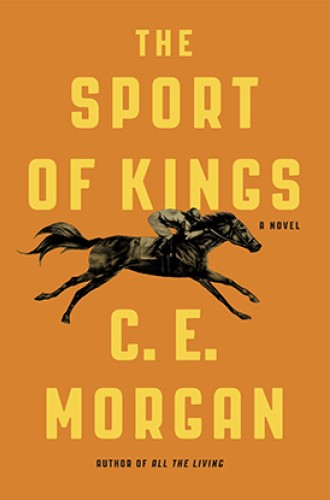Love and horses
In C.E. Morgan’s world, anything goes as long as it’s couched in the language of the equine.
The sport “exists on mystique,” John Jeremiah Sullivan writes in Blood Horses, his memoir and amateur history of horse racing. “If you want a sport of kings in a democracy, you must somehow find a kingdom. . . . Its cult obtains up and down the class ladder,” he continues.
Morgan is a native of Kentucky—she has boomeranged back to her home state after a stint at Harvard Divinity School—so she didn’t have to look far for that kingdom. The Sport of Kings is Faulknerian in its saga of one white family in one place who is facing the reality that its tree must branch if the family wishes to survive. Faulkner’s Mississippi is now Kentucky; his Compsons are now Morgan’s Forges; and Benjy’s fragmented narrative parts are now interludes after each long chapter that may be dreams, scientific jargon, or technical details from jockey manuals.
But mapping Morgan’s book onto The Sound and the Fury doesn’t grant either book the singularity it deserves. While Faulkner chronicles the history of the Compsons primarily by means of their interpersonal affairs, Morgan introduces an intermediary—the business, corruption, wealth, romance, heartache, and sport of racing horses—that absorbs her characters’ thoughts, emotions, and actions. In the South, one learns not to talk about money, sex, politics, and religion. In Morgan’s kingdom, anything goes as long as it’s couched in the language of the equine.
The novel traces the ancestry of Henry Forge, patriarch of a storied and well-to-do family in Kentucky and in horse racing. He loses his wife for many reasons—some due to him and some due to her—and finds himself raising a single daughter, Henrietta. (Henry’s granting her the feminized version of his own name comes as no surprise.) She grows up to become a tomboy with a carnal passion for men that she can barely rein in.
The likenesses to the animal kingdom don’t stop here. Like Sullivan’s anecdotal history of horse racing, Morgan’s book weaves in enough facts about horse ancestry, care, training, and racing for even the most uninformed reader to speak knowledgeably during the next Kentucky Derby. One practice involves inbreeding race horses to maintain a line’s best qualities—speed and stamina. The Forges also like to preserve their family’s “heritage.”
The largest threat to their blue blood, as it was in Faulkner’s Yoknapatawpha kingdom, is the mixing of it with African-American blood. Race tracks remained segregated in Kentucky “well into the 1950s,” writes Sullivan, which remains interesting but not surprising “for a sport with a history . . . of devoted and skillful black grooms.” Morgan inserts one particularly skillful black groom into Henry Forge’s naive and blind white wonderland—with the help of Henrietta and her lustful adolescent rebelling.
The licentious liaisons evolve, however, into that other “l” word, only for Henrietta to learn that this highest of virtues still will not release her from her deep-seated Forge roots.
Did she actually think that love offered some kind of escape? There is kingdom, class order, family, genus, species. You could step out of your heels, walk backward along the hall, recede from their collective gaze, but you could never escape the category of your birth and all the morphological categories which precede it.
This passage about Henrietta falls a little more than halfway through the novel, and I noted in the margin during my first reading of it that Morgan’s epic, like all epics, is a love story.
Horses mediate this particular love story, and Morgan uses her mares and stallions deftly to control her readers’ yearning for redemption—in sport, in love, and in life—so that one never feels halted in traversing her tome. In an interview with her publisher, Morgan stated, “[A] couple of people have said that they cried over particular characters and scenes. I would hope that there’s something that comes after the crying.” This novel shows that there always is.





